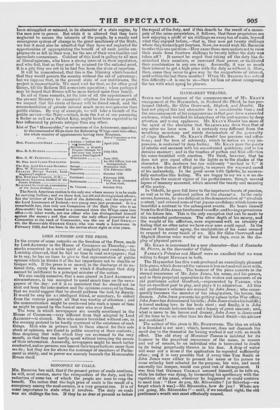LORD ALTHORP AND THE PRESS.
IN the course of some remarks on the freedom of the Press, made by Lord ALTHORP in the House of Commons on Thursday,—re- marks conceived in a noble spirit of simplicity and candour,—his Lordship observed, that he had no time to read newspapers ; that is to say, he has no time to give to that representative of public opinion which he thinks it of the last importance not to shackle or tamper with. If the press is so sacred, in the discharge of its na- tional duty, surely the manner in which it discharges that duty cannot be indifferent to a principal minister of the nation.
We can readily conceive, that a man placed in Lord ALTHORP'S circumstances, is too occupied to spend much time on the news- papers of the day: yet it is so important that he should not be shut out from the information and the opinions conveyed by them, that we would suggest that he should perform the task by deputy. It would be easy for an intelligent friend, or secretary, to collect from the various journals all that was worthy of attention ; and the communication might be condensed into such a space of time as might be spared by the busiest man who ever lived.
The tone in which newspapers are usually mentioned in the House of Commons—very different from that adopted by Lord ALTHORP—is absurd. Men who cannot breakfast without one, in the evening pretend to be hardly cognizant of the existence of such things. Men who in private look to them almost for their sole stock of opinions, are found in public sneering at their contents ; thus despising that with which they are crammed to the very mouth, so that they can hardly speak without betraying the source of their information. Assuredly, newspapers might be much better conducted,andno persons can lament theirimperfections more than we do ; but they are far above the contempt of members of Parlia- ment in ability, and in power are scarcely beneath the Honourable House itself.


























 Previous page
Previous page